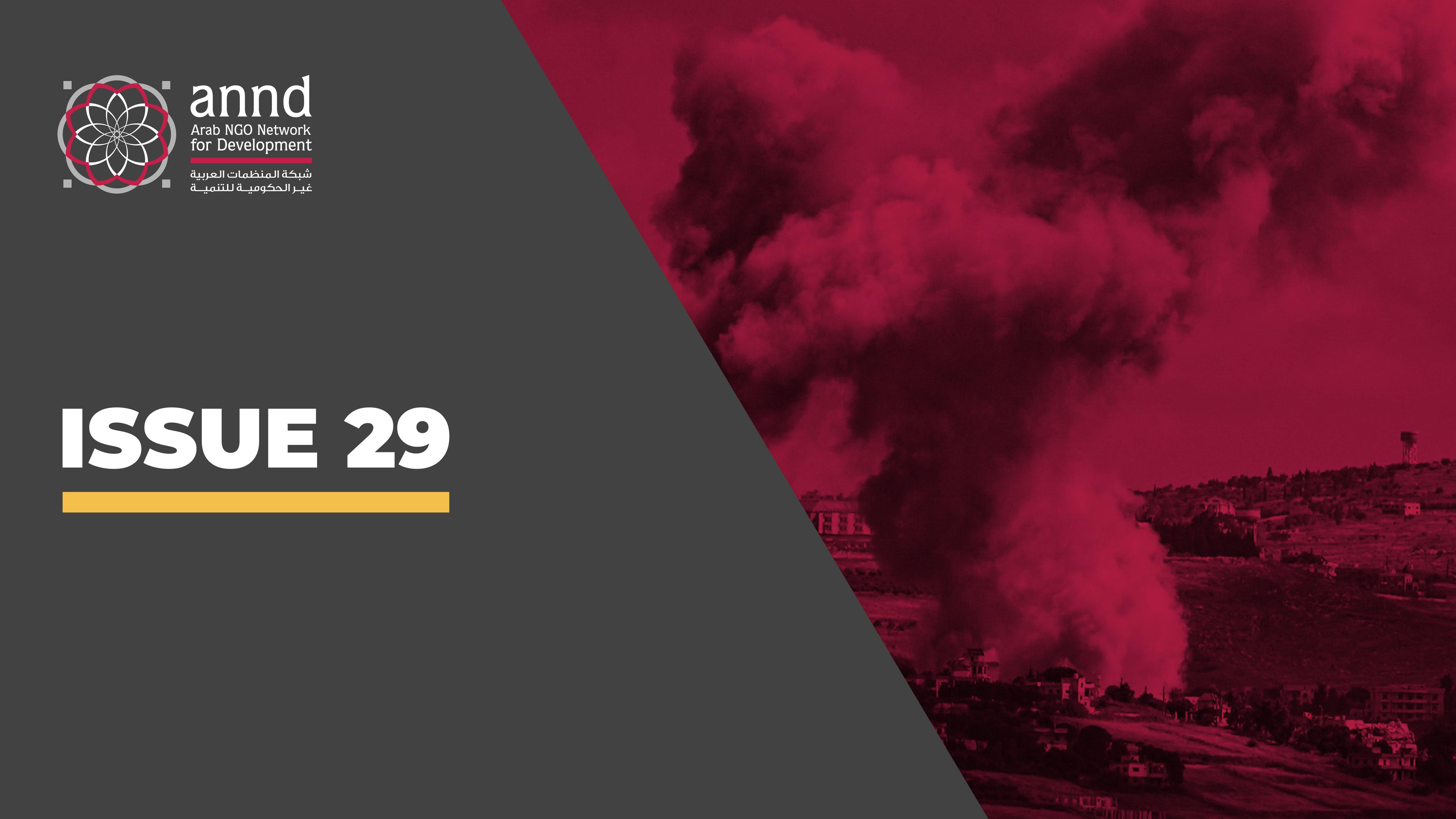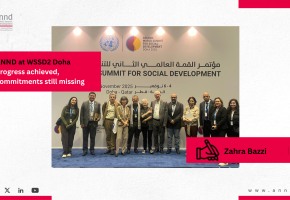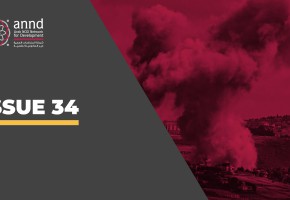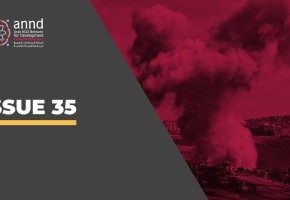A Region on Fire
Issue 29 - October 25, 2024
- International stances are limited to condemnations and warnings, with no concrete actions taken, while Israel’s machinery of killing and destruction continues unchecked.
- Initiative in Gaza or Lebanon appears to be stalling, as if waiting for an event to shift the current situation.
UN Human Rights Commissioner: Israel is Committing Crimes Against Humanity in Gaza
UN Human Rights Commissioner Volker Turk stated that the world must act in response to the darkest moments of the conflict in Gaza. He added that the bombardment in northern Gaza is relentless, there is no safe way out, and those fleeing are being shot at. He called on world leaders to act to ensure respect for international humanitarian law. He said the Israeli military is exposing all Gaza residents to bombing, blockade, and the risk of starvation. Gaza is facing what could amount to brutal crimes, possibly crimes against humanity. Israel continues to ignore the demands previously made by the International Court of Justice in the historic ruling issued on July 19, 2024, following a lawsuit by South Africa
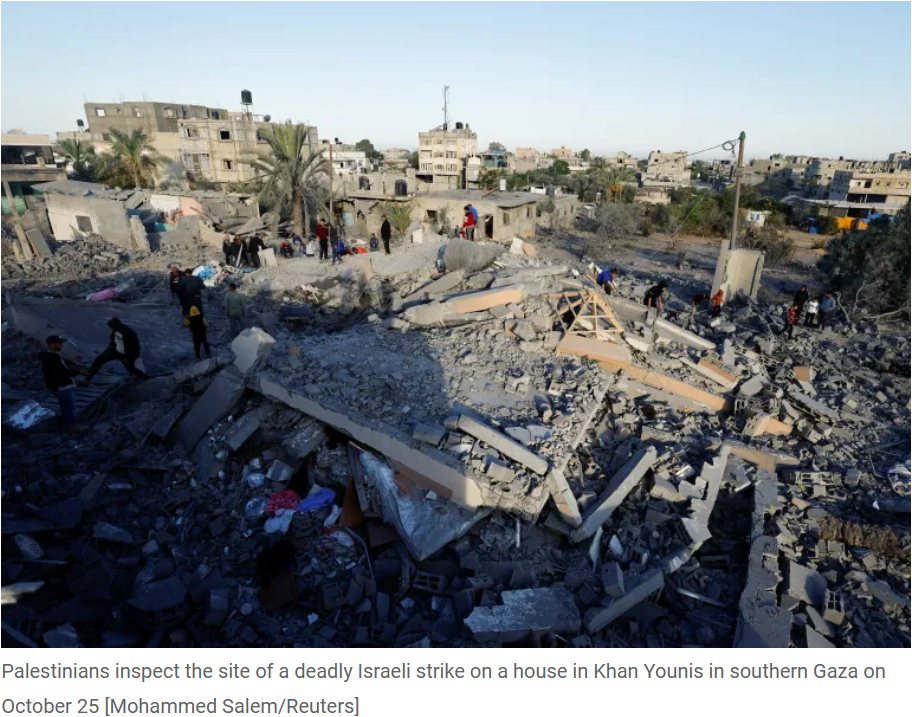
Gaza: Continuing Crimes
On the 385th day of the Israeli assault, the Israeli Army continued its airstrikes, resulting in 88 deaths from attacks on residential homes in Gaza since early morning. Meanwhile, Israel’s Defense Ministry reported the death of 890 soldiers, police, and security personnel since October 7, 2023.
WHO Director-General Tedros Adhanom Ghebreyesus announced that contact was lost with the staff at Kamal Adwan Hospital after reports of an attack. The hospital is crowded with about 200 patients and hundreds of displaced people.
In terms of negotiations, Yedioth Ahronoth quoted an Israeli source saying that the Mossad chief discussed a “hostage deal” with Egypt's intelligence head in Cairo. Later reports indicated that Israeli Prime Minister Benjamin Netanyahu agreed in principle to a proposal discussed in Cairo between Israel’s Shin Bet head, Ronen Bar, and Egypt’s intelligence chief, Hassan Rashad. The plan involves releasing four Israeli hostages in exchange for a temporary two-week ceasefire in Gaza. However, Hamas, through Khaled Meshaal and Osama Hamdan, quickly denied this, stating that it would only agree if there was a commitment to a comprehensive ceasefire and a complete withdrawal of Israel from the Gaza Strip.
U.S. Secretary of State Antony Blinken outlined the main negotiation points, including the return of hostages, a ceasefire in Gaza, a plan for the "next day" that would allow Israel to withdraw from Gaza, prevent Hamas’s return to power, and ensure aid access.
Separately, the International Criminal Court (ICC) announced an unexpected change in the panel of judges assigned to review the prosecution's request for an arrest warrant against Prime Minister Benjamin Netanyahu and others, potentially delaying the case further. The ICC president stated that Romanian judge Iulia Motoc, who was presiding over the case, requested to step down for health reasons, and Slovenian judge Bettie Hoeller was appointed in her place.
There is no fixed timeline for ICC decisions, though it generally takes around three months to rule on arrest warrant requests. On May 20, ICC Prosecutor Karim Khan requested arrest warrants for Netanyahu and Gallant for their alleged responsibility for “war crimes and crimes against humanity” committed by the Israeli army in Gaza since October 7, 2023. Khan reiterated the request for quick issuance of the arrest warrants in August.
Lebanon: Battlefield Developments
Israel attempted to kill 16 journalists by directly targeting their residence at 3 a.m. while they were sleeping in Hasbaya, a relatively safe area in southern Lebanon. This attack killed 3 journalists and injured others. The Israeli air force continued intense strikes on southern Lebanon, the Bekaa Valley, and southern Beirut. On Friday evening, the Israeli army spokesperson warned residents in Burj al-Barajneh and Haret Hreik, followed by six airstrikes in southern Beirut.
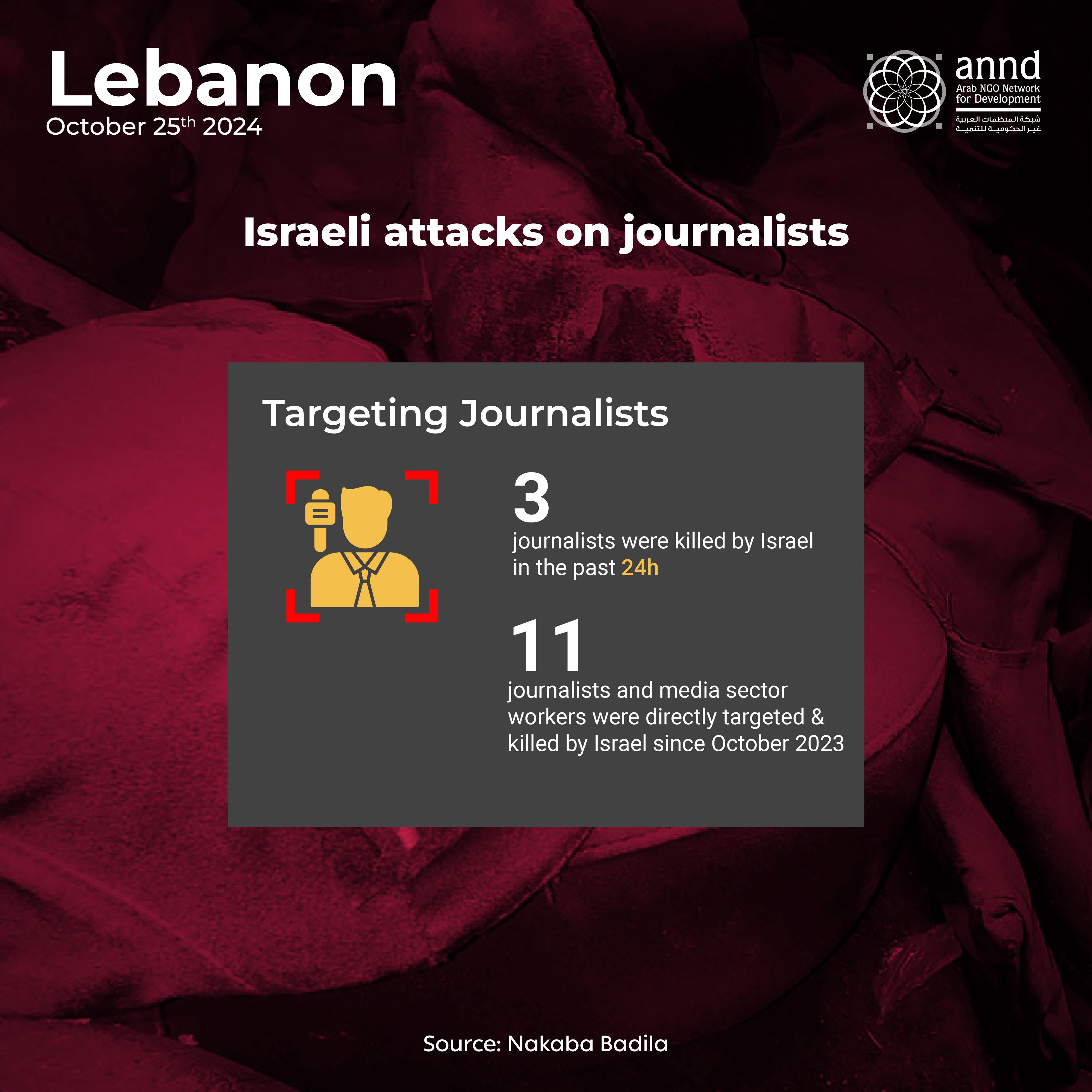
An Israeli strike on Friday morning hit the Syrian side of the border near Hermel in northeast Lebanon, blocking the border crossing used by cars and trucks, according to Lebanon’s Minister of Public Works and Transport. This is now the second of the three main crossings between the two countries that is blocked. The Israeli army reported it destroyed an underground tunnel on the Lebanese-Syrian border used by Hezbollah for "moving large amounts of weapons" into southern Lebanon, warning it would act again if necessary.
A UNHCR spokesperson stated that the agency had not received any warnings from Israel before the airstrikes on the border crossings Friday morning.
Hezbollah announced it had fired rockets at three Israeli targets, including the settlement of Menara, the Haboushit site, and the Carmel base. In related clashes, Israel reported five soldiers killed in southern Lebanon, raising the total to ten in less than 24 hours. According to BBC, Israel also confirmed five soldiers were killed, and around 20 injured during a nighttime rocket attack on a building in southern Lebanon amid ongoing battles with Hezbollah.
UNIFIL announced it had withdrawn from a position in the border village of Dhahira after Israeli forces fired on it, stating, "peacekeepers continue to monitor the situation in southern Lebanon and report to the Security Council despite the dramatic escalation and violence in recent weeks.” UNIFIL reminded all parties of their duty to avoid actions that endanger peacekeepers or civilians.
The Lebanese Minister of Health reported that attacks on health organizations have reached nearly 200 incidents, with 163 health workers killed, 272 injured, and 55 attacks on hospitals—36 of which were direct hits, causing 8 closures.
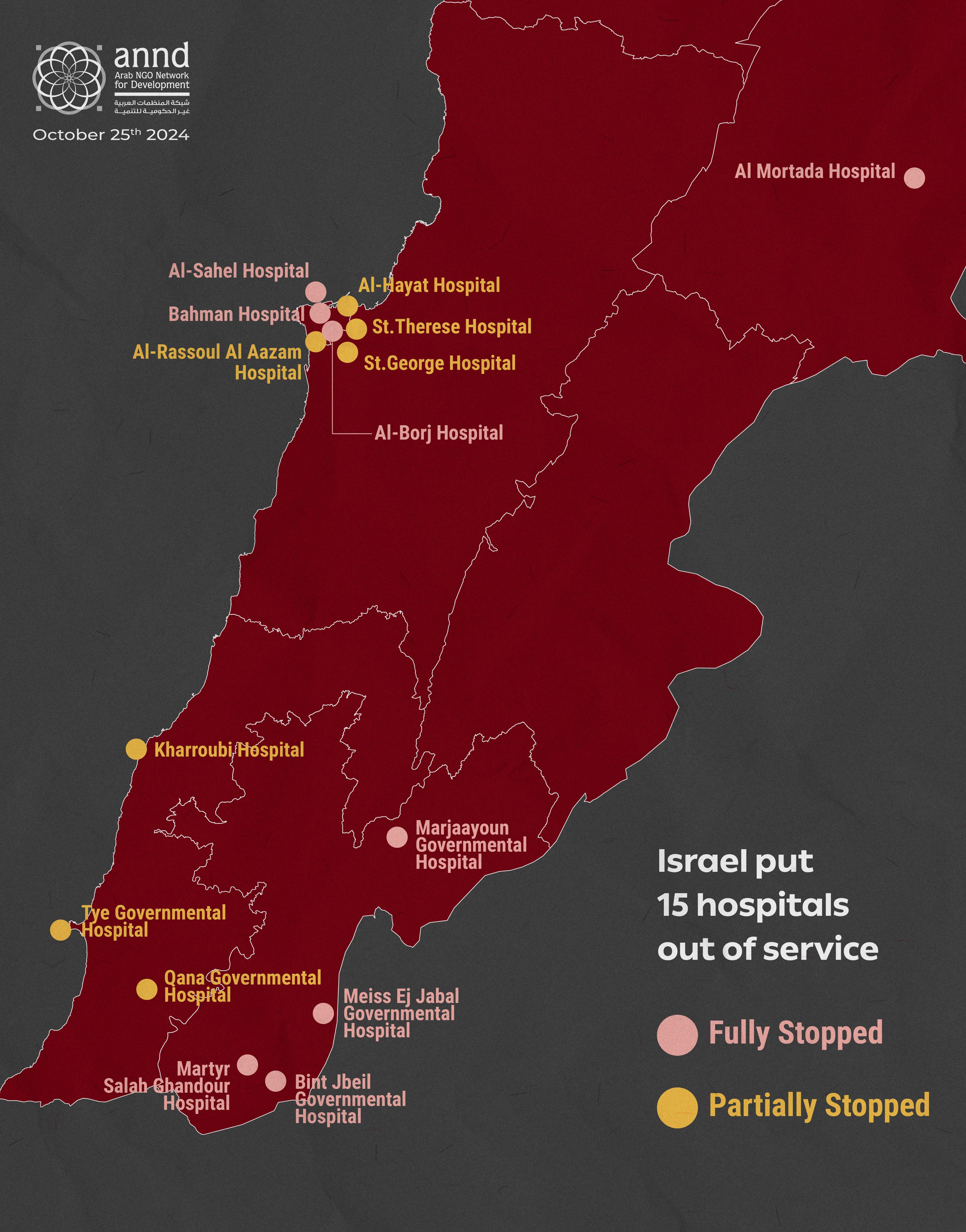
The Lebanese Ministry of Health also reported that over the past 24 hours, 41 people were killed and 133 injured, bringing the total toll since the beginning of the assault to 2,634 deaths and 12,252 injuries.
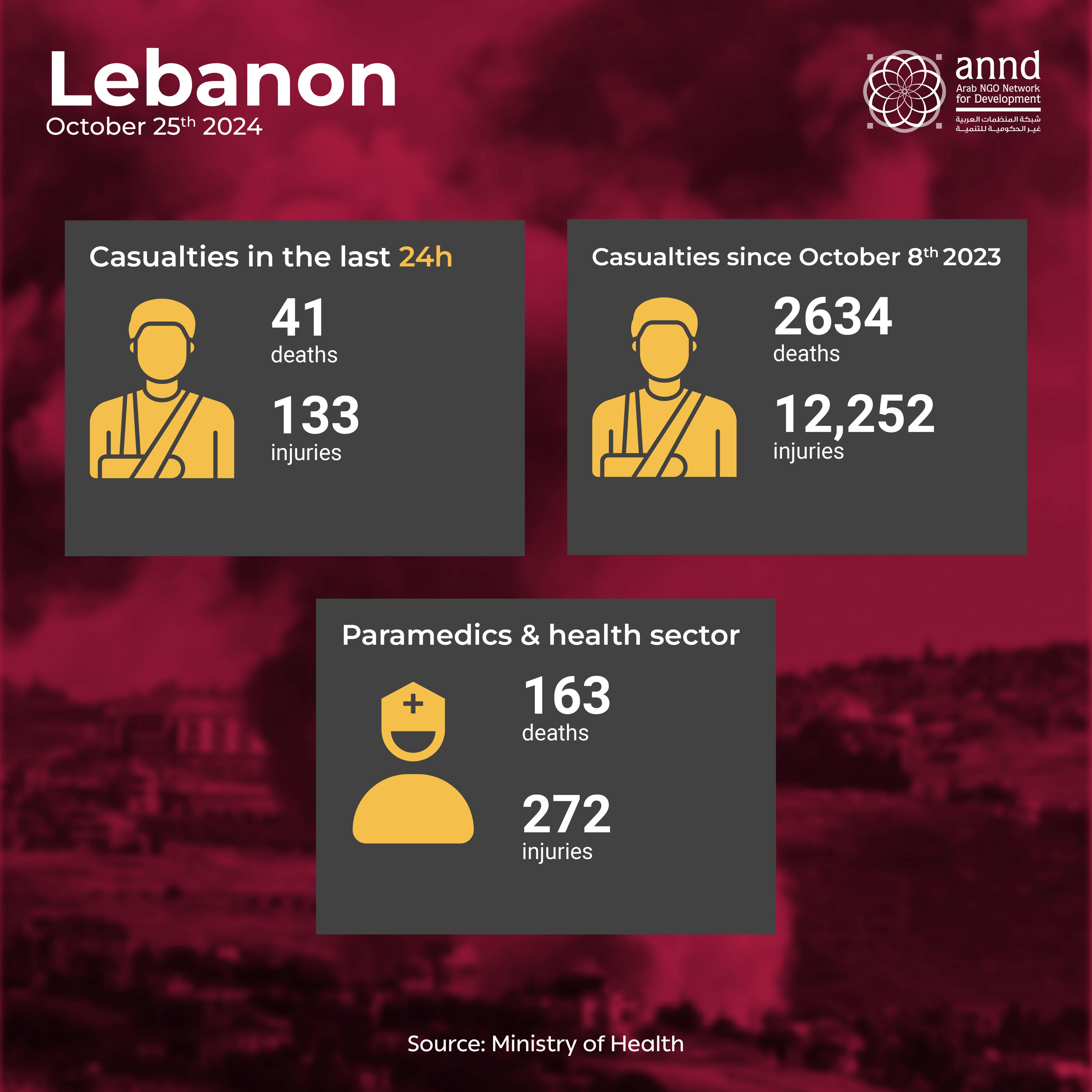
Political Positions
Lebanese Prime Minister Najib Mikati condemned the attack on journalists, calling it a war crime committed by the Israeli enemy. After his meeting with U.S. Secretary of State Antony Blinken, Mikati reaffirmed Lebanon's commitment to UN Resolution 1701, stressing that it must be implemented without modification. He emphasized the need for Israel's genuine commitment to a ceasefire. Several ministers described the attack on journalists as a brutal crime, adding to Israel’s list of crimes against innocent civilians throughout Lebanon.
Parliament Speaker Nabih Berri thanked French President Emmanuel Macron and France’s government and people for organizing the international conference supporting Lebanon’s financial, political, and humanitarian sovereignty. Berri expressed that the conference's financial support for refugees and aid to the Lebanese army to secure national sovereignty alongside UNIFIL, under UN Resolution 1701, reinforces the belief that Lebanon is not alone in facing existential threats.
Former Progressive Socialist Party leader Walid Jumblatt voiced his hope that the Gaza scenario does not happen in Lebanon. He asked, How far will Israel go, and what are its new ambitions? He referred to rumors of settlement plans reaching beyond the Litani River, calling for clarity. Jumblatt added that some in Lebanon aim to apply international resolutions through Chapter VII, which he argued is impossible, stressing that dialogue is essential. He also remarked that it is time for Iran to acknowledge that Lebanon is a sovereign state.
Meanwhile, Lebanon has been added to the Financial Action Task Force (FATF) "gray list," which monitors countries under scrutiny for addressing financial crimes. The gray list includes countries with deficiencies in combating money laundering and terrorist financing, though they are actively working with FATF to improve. Lebanon’s inclusion in this list casts a negative shadow on its financial and economic status, potentially leading to additional restrictions on international bank transactions and increasing costs for Lebanese institutions abroad.
Humanitarian Response: Lebanon Faces a Catastrophic Humanitarian Crisis
“Lebanon is now facing a humanitarian crisis of catastrophic proportions, with mounting civilian casualties, mass displacement and extensive destruction of civilian infrastructure across the country”. This was stated by the UN Special Coordinator for Lebanon, emphasizing that the protection of civilians must be a top priority. Jeanine Hennis-Plasschaert, the UN official, expressed concern over the rising number of attacks on health facilities and their workers, noting that first responders heeding the call to help, including healthcare personnel and paramedics, have also been hard hit.
Economic bodies have pointed out that the success of the Paris international conference in raising $1 billion—far exceeding the expected $500 million—reflects the strong global support for Lebanon and the commitment to protect its stability. Nasser Yassin, head of the Central Emergency Committee, stated that the conference established mechanisms to follow up on aid expected to arrive through international organizations working in Lebanon. Additionally, Energy Minister Walid Fayyad announced that the war has caused losses of $480 million in the energy sector, with the conference designating funds for service sectors. It is worth noting that the allocated amounts are distributed as follows: $800 million for relief efforts, approximately half of which is designated for the maintenance of infrastructure and public services such as water, electricity, and telecommunications, while the other half is allocated for relief efforts and medications. Additionally, $200 million is allocated for the Lebanese Army.
The Beirut Disaster and Crisis Management Room announced that displaced individuals living in tents along the Beirut waterfront have been moved to a shelter center in the Karantina area, which accommodates over 400 displaced persons. The Beirut Fire Brigade, in cooperation with Internal Security Forces, coordinated the transfer from the waterfront to the newly established shelter.
As of Thursday, 1,097 approved centers have been opened to accommodate and receive displaced persons, with 929 of these being designated as maximum response centers. Displacement continues from areas under popular assaults to more distant regions, with registered displaced persons numbering 190,975 (43,712 families) in the approved shelter centers. The highest registration rates of displaced persons are in Mount Lebanon and Beirut, though the actual number is much higher.
The UN High Commissioner for Refugees highlighted the plight of refugees fleeing Lebanon amid the ongoing war by the Israeli army. The UN office in Geneva reported that 430,000 people have fled to Syria alone since the escalation of Israeli attacks on Lebanon. However, border crossings have also come under attack, posing risks for both refugees and UN personnel.
An Emirati shipment carrying 2,000 tons of aid has arrived at the Port of Beirut. The British Embassy in Lebanon issued a statement confirming that the Royal Air Force transported over 12,500 food packages and 79 medical supplies to the Lebanese army.
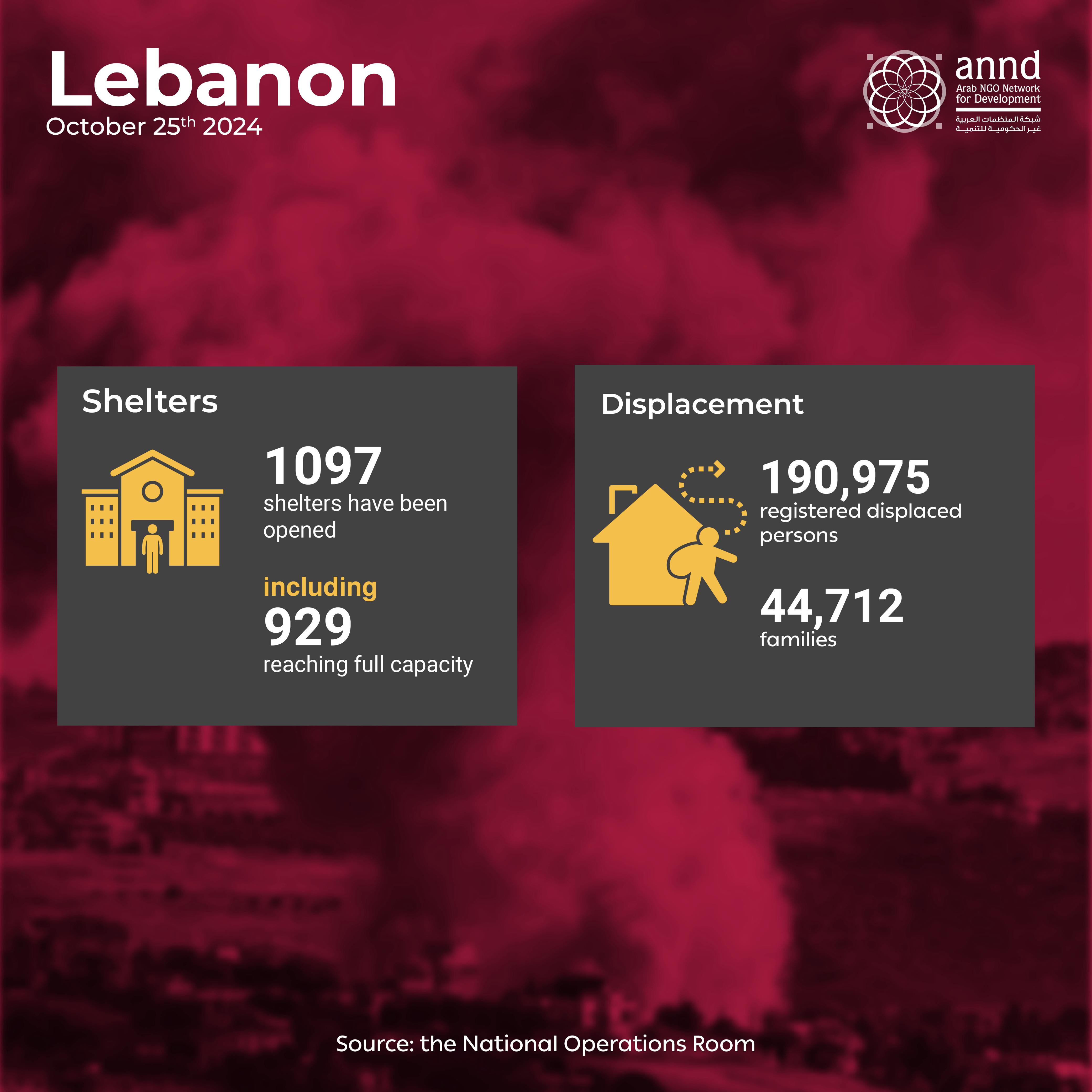
International Positions
The United Nations announced that Israel's targeting of the border between Lebanon and Syria threatens a vital lifeline.
The UN Office for Human Rights stated that journalists are considered civilians under international humanitarian law and must be protected in all conflicts.
U.S. envoy Amos Hochstein remarked that the war between Israel and Lebanon could end under Resolution 1701. He noted that both Israel and Hezbollah accuse each other of not adhering to the resolution, but in reality, neither has complied. He emphasized that Lebanese armed forces should be allowed to effectively deploy in southern Lebanon and fulfill their duties. He added that once a ceasefire is established, assistance should be provided to Lebanon, With an economic aid package as a strong economy would enable Lebanon to be more independent from Iran.
The United States and the European Union called for a diplomatic solution to the escalating war between Israel and Hezbollah. U.S. Secretary of State Antony Blinken highlighted the urgent need for a diplomatic resolution in Lebanon amid ongoing Israeli military operations there. Following his meeting with Prime Minister Mikati in London, Blinken said on Friday there was a real sense of urgency in getting to a diplomatic resolution to end the conflict in Lebanon between Israel and Iran-aligned Hezbollah, while calling for the protection of civilians.
EU foreign policy chief Josep Borrell on Friday said the international community must speed up efforts for a political solution to end the fighting in Lebanon and prevent a “conflagration.” He said the Lebanese Armed Forces must become the “only military force present” in the south of the country, where Israel is engaged in ground battles with Hezbollah. A UN peacekeeping mission in the area must also be strengthened, he said.
The British Embassy in Lebanon stated that the UK government is fully committed to peace in the Middle East and continues to call for de-escalation in the region.
Jordan's Foreign Minister described the situation in northern Gaza as ethnic cleansing by Israel.
Israeli Chief of Staff Herzi Halevi told his soldiers during a visit to northern Gaza that there is a possibility for the end of the war and military operations against Hezbollah in Lebanon, given that the leadership hierarchy of Hezbollah has been completely dismantled.
